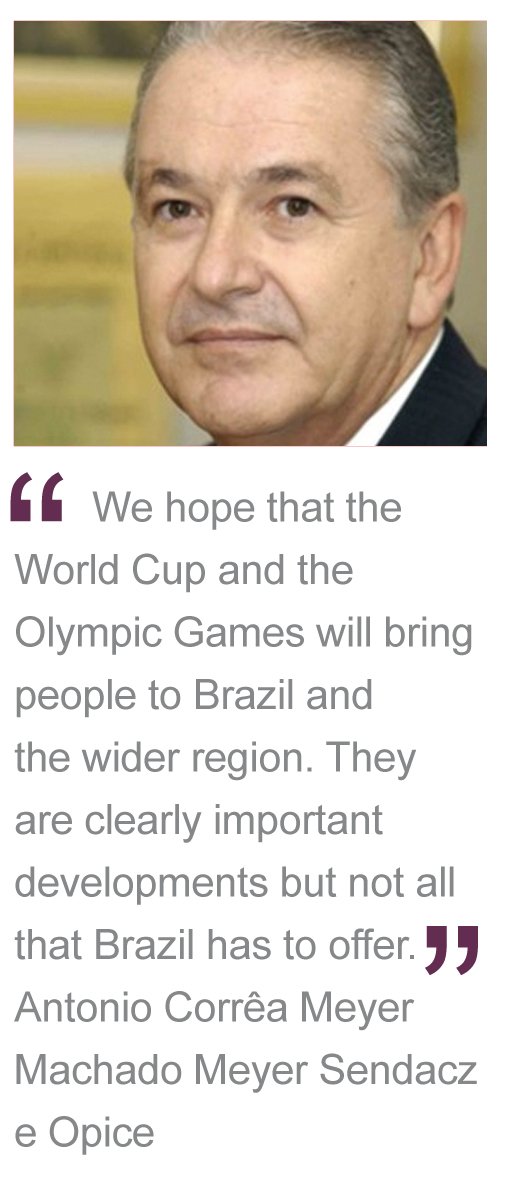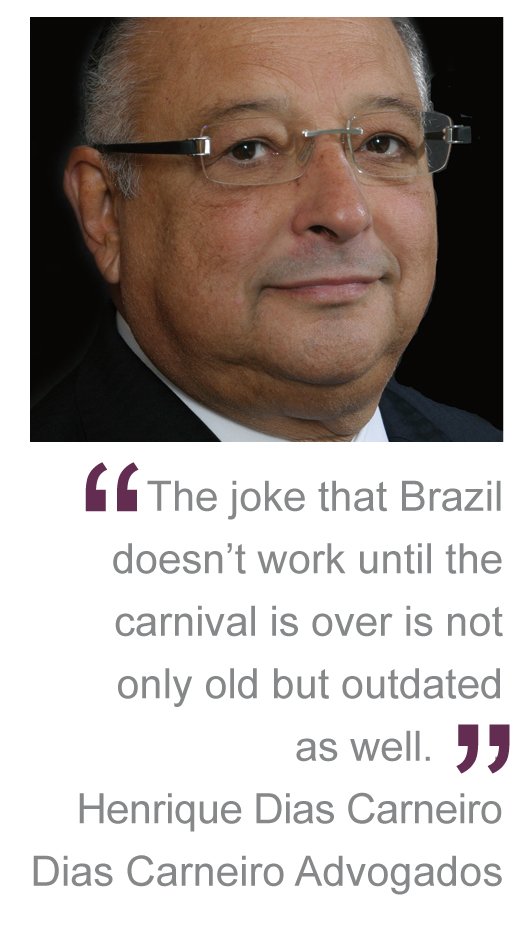Brazil Report 2011: Brazil: still the future?
Brazil’s hosting of the World Cup and Olympic Games is bringing inevitable investor interest but local lawyers insist that opportunities extend well beyond sporting events
Western Europe may be seeing debt and unemployment levels at best plateau, at worst continue to rise, but this is in stark contrast to Latin America’s largest economy, Brazil. It was the last country to feel the global financial crisis and the first out of, say lawyers in São Paulo. The country is booming.
“It seems strange to be somewhere where there is no talk of `crisis´. There is huge optimism in Brazil, it is palpable in the street,” says Luis Riesgo, formerly Managing Partner of Jones Day in Madrid but who is now leading the firm’s entry into Brazil.
Some question however whether Brazil’s growth is sustainable. The country will host both the 2014 World Cup and 2018 Olympic Games but is there more to investment opportunities than stadia and tourism – has investor interest in the country merely risen as a result of a lack of options elsewhere?

Economic driver
There is no doubting the strides Brazil has taken over the past decade. The country is now the world’s seventh largest economy and the largest in Latin America. São Paulo is regarded as the region’s financial capital while the Brazilian economy as a whole grew 7.5 percent in 2010 – three times the Latin American average. The country’s automobile, aerospace, steel, construction and petrochemicals sectors are all seeing significant growth, while demand for the country’s natural resources and agricultural products is at a high.
Over the past five years the value of the São Paulo Stock Exchange (BM&FBOVESPA) has more than doubled, from a low of 30,000 points in 2007 to 70,000 points currently. The past year saw it host the largest listing since the global financial crash, the $7bn (€5.4bn) partial IPO of Santander Brasil, and companies are now seeking access to the country’s capital markets as well as its expanding consumer markets, say lawyers.
“So far in 2011 we have experienced, in the first quarter of the year, an unusual number of new transactions and projects, showing that the old joke that Brazil doesn’t work until the carnival is over is not only old but outdated as well,” says Henrique Dias Carneiro, Managing Partner of Dias Carneiro, with which Uría Menéndez has an association. “It’s worth mentioning that the transactions are not only inbound, but also outbound, reflecting the new position of Brazil in the international community.”
The eight year tenure of President Luiz Inácio Lula da Silva (Lula) may have come to an end after elections in 2010 – won by his chosen Workers’ Party sucessor Dilma Rousseff – but he is still credited with bringing political and economic stability to the country. Brazil is enjoying unparalleled investment from the US, Europe and Asia, with China a lead trade partner. Foreign inward investment has averaged around $30 billion in recent years up from an average of $2 billion in the 1990s.
The country’s population is close to 200 million with around 30 million believed to have risen out of poverty during Lula’s Presidency and the process continues. 150 miles off the coast of southern Brazil, the biggest oil discovery of the past 30 years has recently been discovered. If the “pre-salt” reserves are proven, it could catapult the country up among the world’s top five oil producers.
“Brazil’s growth is sustainable and in a sense will be self perpetuating for the next decade at least as millions more move out of poverty. Inflation may be a concern but it is nowhere near the levels we have seen in previous decades,” says José Luis de Salles Freire, Managing Partner of leading firm TozziniFreire.
The reach of Brazilian business is also now extending well beyond the country’s own borders. As well as becoming increasingly prominent across Latin America, its infrastructure, manufacturing and oil industry is expanding around the world.
“A significant element of our practice will clearly be devoted to inward investment but we also see opportunities to assist in the further international expansion of Brazil’s own companies, to Europe, the US and elsewhere,” says Riesgo at Jones Day.
The two largest Portuguese M&A deals of the past year, indeed of recent years, both had a Brazilian focus – Brazil’s demand for construction materials prompting a three way fight for control of Portugal’s largest cement producer, Cimpor. Likewise, the Iberian M&A deal of last year was Telefónica’s acquisition of the 50 percent share of Brazilian mobile operator Brasilcel it did not already own from Portugal Telecom (PT), in a hostile takeover that cost it €7.5bn.
The complexity and multi-faceted nature of Brazil’s federal, state and local legal and tax systems can however present challenges to investors. Lawyers in São Paulo therefore see continuing opportunities in managing this continuing flow of inward investment and marrying up the myriad of local and national legal and tax rules.
“We now see investors from all over the world, and one significant outcome already of the increase in size and scale of the domestic economy and the arrival of foreign companies is that Brazilian companies are now much more formal in the way they are conducting their business. There is much greater demand for legal input,” says de Salles Freire.
New players
Such opportunities are also encouraging the arrival of new legal players in to the Brazilian market. The role and position of foreign law firms is however currently the subject of much contentious debate in Brazil. Foreign law firms must register with the Brazilian Bar Association (OAB) and may only operate as a Foreign Legal Consultancy (FLC). Firms may not provide domestic legal services or share profits with local associated firms.
Nonetheless, the lines are getting increasingly blurred between domestic and international practices, say some, with a number of international firms having sought to build their own local brand franchises.
“Many law firms have a long history of operation in Brazil, notably from New York, and continue to feature prominently in the legal market. They have opened offices in São Paulo but still provide US, or at least non-local services. This is clearly a very different strategy to that being adopted by some of the more recent law firm arrivals,” says José Luis de Salles Freire.
Those firms to have opened offices in the city in recent years include Chadbourne & Parke, Milbank Tweed Hadley McCloy, Skadden Arps Slate Meagher & Flom and Simpson Thacher & Bartlett, alongside Linklaters, Freshfields Bruckhaus Deringer, DLA Piper and now Jones Day.
Of Iberia’s law firms, Uría Menéndez is already well established alongside Dias Carneiro. Other firms are however seeing a change in their Brazilian strategies. In 2009 Garrigues experienced the departure of the local Brazilian member of its Affinitas Alliance, Barbosa Müssnich & Aragão, reportedly over divergent opinions as to the degree of integration the Alliance should have. The Spanish-led firm is now however focusing less on integration and more on co-operation.
In 2010 it announced an association with 26-partner Rio-based firm Schmidt Valois Miranda Ferreira & Agel Advogados and is awaiting approval to open its own office in São Paulo.
Likewise, Cuatrecasas has cut its formal alliance with Machado Meyer Sendacz e Opice and is now working with a number of firms locally, including Pinheiro Neto and arbitration boutique Carvalhosa e Eizirik Advogados. Gómez-Acebo & Pombo may have left the Club be Abogados, of which Pinheiro Neto was a founding member, but still works alongside it and others now in the market.
By contrast, few Portuguese firms have seen change in their local strategies. Among the leading firms, PLMJ works alongside TozziniFreire, Vieira de Almeida with Pinheiro Neto, SRS Advogados with Veirano Advogados, and MLGTS with Mattos Filho Veiga Filho Marrey Jr e Quiroga. A more recent tie-up is mid-size Lisbon firm Baião, Castro & Associados´ alliance with Rio de Janeiro and São Paulo-based Lotti e Araújo Sociedade de Advogados (Brasil).
The Iberian offices of international firms are also taking on increased importance as a conduit for Latin American and specifically Brazilian operations. DLA Piper, through its Madrid office, has a collaboration agreement with 85-lawyer Campos Mello. Davies Arnold Cooper has likewise established a Brazilian collaboration, with niche insurance and litigation firm JBO Advocacia.
Not all that glitters is gold
Despite the evident attractions to Brazil and the “gold rush” mentality that seems to have infected some market observers, lawyers note however that barriers to entry do remain.
“An old slogan from the 1970s stated that ‘Brazil was the Country of the Future’, and at the time few believed it. Now that the future has arrived we have to tell ourselves not to get too carried away,” says Miguel Tornovsky, Corporate Partner with Pinheiro Neto, Brazil’s largest law firm.
Nonetheless a strong belief exists among the São Paulo legal community that the country offers a more stable investment environment than the other so-called BRIC countries (Brazil, Russia, India and China). “We have a long tradition of inward investment and the requisite legal frameworks to encourage and protect those made by foreign companies,” says de Salles Freire at TozziniFreire.
Tornovsky agrees: “There are of course challenges to doing business in Brazil. Some investors take the view that there is more certainty in building new manufacturing plants from the ground up rather than take on the liabilities of acquired companies. When it comes to enforcing judgments judicial and arbitral rulings rendered in the country are significantly easier to enforce, but the simple fact that these frameworks exist can also provide investors with comfort.”
But investment is continuing, and many lawyers suggest that while the World Cup and the Olympic Games may be the most public endorsement of the country’s economic turnaround, they are merely an opportunity to showcase achievements to date rather than the culmination of Brazil’s development.
“What we hope is that these events will bring people to Brazil and the wider region and help us to develop relationships with new markets. They are clearly important developments but not all that Brazil has to offer,” says Antonio Corrêa Meyer Managing Partner of another prominent corporate firm Machado Meyer Sendacz e Opice.
Cleary the concrete needs to be poured to build the stadia, and investment is required in the hotel sector, but the Government has incorporated the World Cup and Olympic Games into a $1.2tn (€830bn) project to build new infrastructure. Encouraged by which, one of the largest transactions of the year to date has been the acquistition by Iberdrola, Spain’s biggest power utility, of local energy producer Elektro from Ashmore Energy International (AEI) in an all cash €2.4bn deal.
“Well before Brazil and Rio de Janeiro were chosen as hosts of the World Cup and the Olympic Games, the Brazilian Government had expressed concern about the country’s lack of infrastructure – power generation and transmission, ports, airports, highways, railroads – which was jeopardising the capability of the country to grow at the envisaged levels. This concern was translated into a program aimed to expedite the projects in all areas of infrastructure (Programa de Aceleração do Crescimento),” says Dias Carneiro.
Such levels of investment indicate both the scale of opportunities present and the value being assigned to an economy that is about more than football, say Brazil’s lawyers.
Among the newcomers too, there is a sense that the change being experienced is for the long-term and that the rise in deal and asset values being seen reflects the growing strength of the economy and prices in opportunities that will continue well beyond the quenching of the Olympic flame.
“Like many in the market we are taking a long term view of Brazil,” says Riesgo This is a life-changing move and a significant step forward for the firm. There is everything here to do. Like the country itself we want to build a sustainable future”















